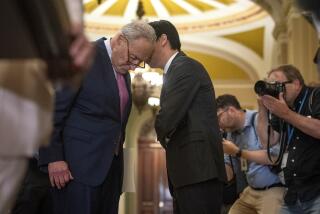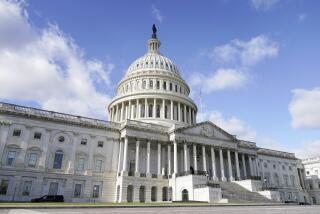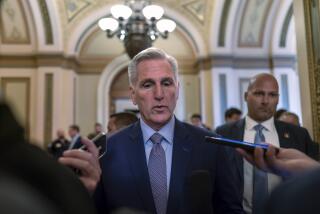Cracks Form in Congress’ United Front
WASHINGTON — Subtle tensions are emerging between congressional leaders and rank-and-file legislators over how long to suppress policy differences between the political parties following the Sept. 11 terrorist attacks.
Seeking to present an image of unity, the congressional leadership in both parties have emphasized private negotiations over public confrontations on the major issues Capitol Hill has faced since the tragedy.
But now that approach is generating grumbling among other lawmakers and party strategists, especially on the Democratic side. The fear: that the muted approach may blur differences on domestic concerns the parties should stress in next year’s congressional elections.
“I think very few people in the Democratic Party want to go back to fighting,” said Jennifer Palmieri, press secretary at the Democratic National Committee, “but we are eager to start talking about the differences we have [with Republicans] on the economy.”
Similar concerns are surfacing inside GOP ranks. “We are having the same kind of discussion,” said one high-ranking GOP strategist. “There is only so long each caucus is going to let their leaders negotiate carte blanche.”
Inside both parties, the conflict could crystallize in the ongoing discussions over a stimulus plan to reinvigorate the sagging economy.
At a White House meeting Tuesday, President Bush and a bipartisan group of congressional leaders agreed to try to privately negotiate a stimulus plan with a minimum of public discord, sources familiar with the conversation said. That’s the model the two sides followed on last month’s financial aid package for the airline industry and are using on legislation to improve airport security and strengthen the Justice Department’s ability to track suspected terrorists.
But several Democratic operatives say pressure is growing inside the party to permit a public debate that would highlight the parties’ differing stimulus priorities, even if the two sides ultimately reach agreement. “After the airline bill, I sat in a lot of party caucuses and a lot of people were upset,” said one senior House Democratic aide. “I don’t think people are going to be comfortable with [House Minority Leader Richard A.] Gephardt and [House Speaker J. Dennis] Hastert sitting down and cutting a deal.”
Likewise, GOP operatives say members will have difficulty following their leaders on a plan that accepts Democratic goals.
“It’s not like Democrats can say, ‘Give us minimum wage, we’ll give you your capital-gains tax cut,’ ” the strategist said. “It’s not that simple. . . . You are going to have a natural disagreement. The question is whether you have a full-blown argument.”
The debates within both parties turn on a fundamental question: At a moment of such national crisis, when is it appropriate to air genuine policy differences, especially on issues not directly related to the conflict? So far, neither party has entirely settled on its answer.
“We all have to recognize this is a genuine national crisis, and there’s no question, people are subduing their normal partisan instincts,” said GOP pollster Bill McInturff. But, he added, “I just find it very hard to believe we are going to have an entire year where this is a stable operating model for how Congress works, especially for issues not connected with” the terrorist attacks.
Even longtime Washington observers have been surprised by the durability of the partisan cease fire. Several distinct factors seem to explain the conciliatory approach.
Most important has been a deeply felt desire to maintain unity on matters directly relating to a crisis that members of Congress, as much as ordinary Americans, see as an extraordinary threat to the nation.
Also important has been the deepening of personal relations both across party lines on Capitol Hill and between congressional Democrats and the White House. Reinforcing these attitudes, operatives in both parties agree, has been a fear the public would punish whichever party appears to be bickering at this unusual moment.
But particularly among Democrats, those most directly concerned about the 2002 elections appear eager to draw lines again with the GOP, not over the response to the attacks but on issues such as education and health care.
“We were working on a very potent policy agenda” before the attacks, said Jim Jordan, executive director of the Democratic Senatorial Campaign Committee. “If that was suspended for the next 13 months, that would be bad news.”
One intriguing measure of the simmering tension between party leaders and those worrying about 2002 came Saturday at the Iowa Democratic Party’s annual fund-raising dinner. Former Vice President Al Gore made headlines by urging Democrats to maintain bipartisan support behind Bush “for as long as our country faces this threat.”
But two Democratic candidates on the ballot next year struck very different notes in their speeches. While supporting Bush’s response to the attacks, Iowa Gov. Tom Vilsack and Sen. Tom Harkin of Iowa argued that the party should return to its agenda on issues such as the patients’ bill of rights and prescription drugs for seniors. “We cannot let this lead to paralysis at home,” Harkin told the crowd.
In avoiding conflict, the toughest test for Congress will be the stimulus bill. Though the consensus is the two sides will reach agreement, it may not be possible to do so without much more public conflict than Washington has seen in the last three weeks.
For starters, the two sides are starting from very different policy positions. Democrats are talking about a tax rebate for families that pay payroll but not income taxes; expanded unemployment benefits; and more infrastructure spending. Republicans are emphasizing tax cuts (particularly in capital gains and the corporate tax rate), though Bush also urged aid for displaced workers at Tuesday’s meeting.
Many Democratic political strategists are chafing at the prospect of another quick deal that denies them the opportunity to underscore these contrasting approaches.
The irritation isn’t as great in GOP circles, but Republican conservatives also are leery of preemptively negotiating a stimulus package. “It’s not going to be ‘here it is, take it or leave it,’ if it’s fundamentally flawed policy,” said an aide to one top conservative GOP legislator.
Yet aides say the leaders in both parties remain convinced that voters still have little stomach for open conflict. And some Democratic strategists argue their party has an additional reason to avoid confrontation with Bush: his skyrocketing approval rating. “When someone is at 90%,” said pollster Mark Penn, “you hug him.”
More to Read
Get the L.A. Times Politics newsletter
Deeply reported insights into legislation, politics and policy from Sacramento, Washington and beyond. In your inbox three times per week.
You may occasionally receive promotional content from the Los Angeles Times.







